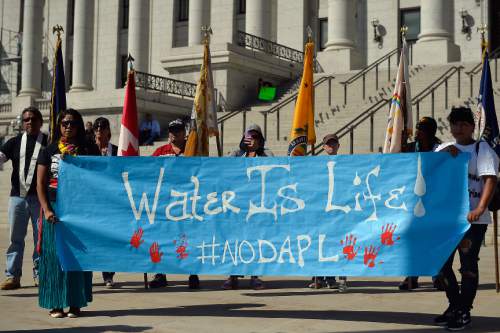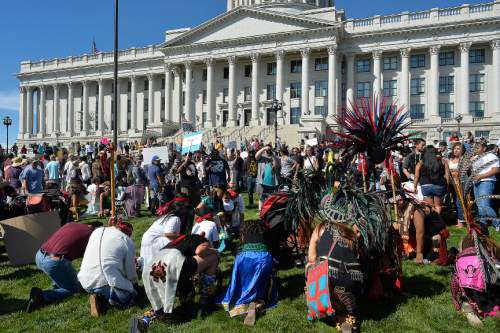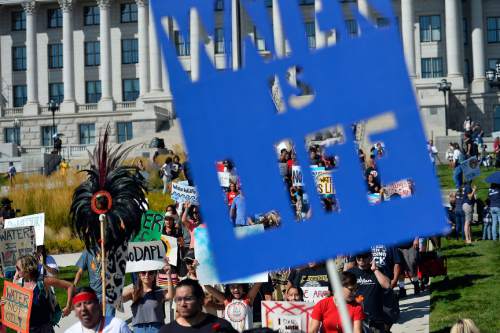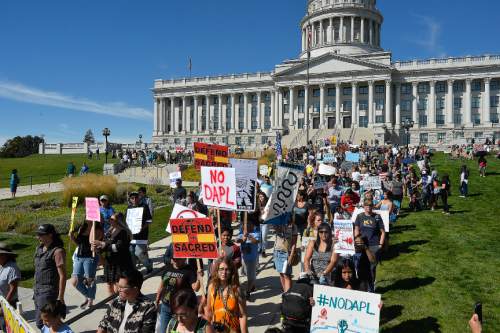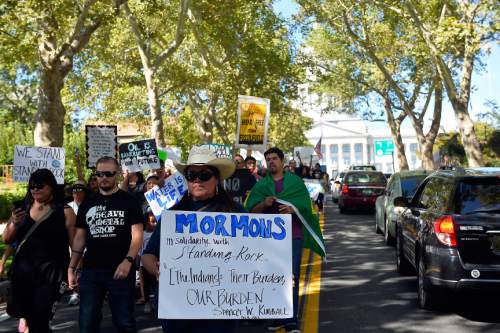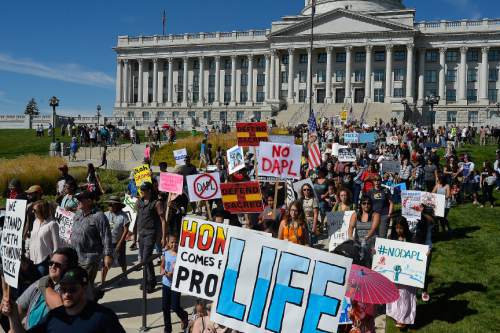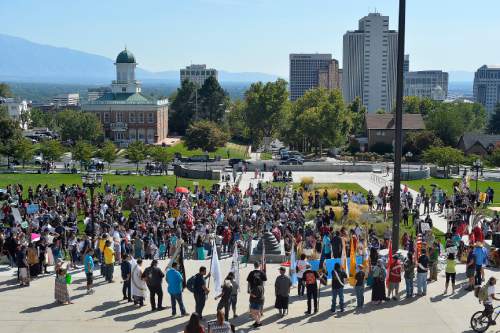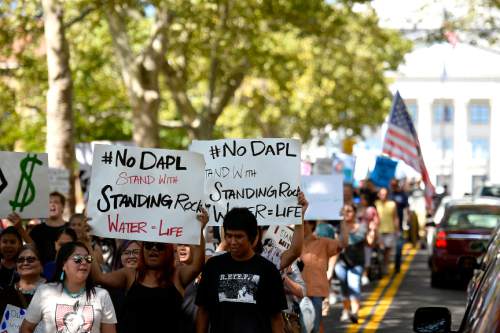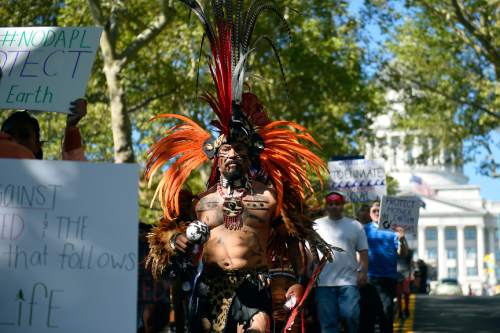This is an archived article that was published on sltrib.com in 2016, and information in the article may be outdated. It is provided only for personal research purposes and may not be reprinted.
The pounding of drums felt like a heartbeat — each thump on the leather sent a visible pulse through the crowd, igniting babies' coos and peoples' yawps.
That sound lent a constant rhythm to the rally of 300 people at the state Capitol on Saturday, each of whom came with their own perspectives but also the desire to stand together under a shared message.
"Their struggle is our struggle," said Moroni Benally, who identified himself as an indigenous scholar.
The protesters — mainly Native Americans — hoped to raise awareness and donations for the Standing Rock Sioux tribe's fight against an oil pipeline in North Dakota, which would cross a river north of the group's reservation. The federal government temporarily halted construction of the Dakota Access pipeline (DAPL) while thousands of people make camp on the proposed grassy fields it would run over. Those in opposition fear the pipeline would contaminate water, poisoning the Native Americans living nearby.
To show support, those rallying in Utah signed a large banner they plan to send to the more than 200 tribal representatives stationed there. They also sang, chanted "one nation, one people," and carried white posters reading "300+ years disrespecting Native American rights is enough."
Some wore beaded moccasins while others donned black sneakers. Some had feathered headbands while others chose baseball caps. But they all stressed a message of peace and reverence for the land.
"It's not just a stand against oil. It's more than that," Benally said. "It's not just a stand for sacred land. It's more than that. This is a stand for basic humanity."
The pipeline company promotes the buried 1,170-mile project as a boost to local economies and a safe transportation method for the oil.
Several people at the rally carried handmade signs that said "water is life." Twelve-year-old Wiyaka American Horse, from the Standing Rock reservation, feels that concern firsthand. She worries the pipeline on her homeland will hurt generations yet to come.
"I want this river to be around when my children are older," she said.
Her aunt, Donna Eldridge, a Navajo, agreed, calling the pipeline "really corrupt."
"Their ancestors have been protecting this land and water for centuries," she said, her blue and white beaded earrings swaying as she walked. The two women wore black T-shirts with "No DAPL" spelled out in white letters.
In blessing the event, a tribal spiritual leader urged the crowd to "protect our sacred elements." He flicked drops of water from a fan of feathers toward each cardinal direction and thanked Mother Earth and Father Sky for their resources.
Nathan Manuel, which he refers to as his "colonized name," is an indigenous man from Arizona's Sonoran Desert and a University of Utah student who earlier traveled to North Dakota to protest the pipeline. He fears "people think we are mascots before we are people," and wants native lives valued the same as others in the United States.
During Saturday's protest and with his back turned to the Capitol, Manuel said political leaders and police officers are part of the problem.
"It's not criminal to protect our water," Manuel said. "Whether they put dogs on us, mace us or throw grenades, we stand together. We will win this."
The rally's organizer, Carl Moore, Hopi and Chemehuevi, prayed that "hearts may be softened" and plans for the pipeline scrapped. Wearing a red headband with feathers attached, Moore could be seen weaving through the crowed throughout the event, asking people to donate, encouraging tribal members to sing and calling for participation on the front line in North Dakota.
"There are people there on our behalf, not just as Native Americans but as human beings," he said.
As the protesters left the Capitol, marching down State Street to the Salt Lake City Library, the drum continued to beat in the background.
Twitter: @CourtneyLTanner —
Work halted on another section of pipeline
A federal appeals court has ordered a halt to construction of another section of the Dakota Access oil pipeline in North Dakota.
A three-judge panel of the U.S. Court of Appeals for the District of Columbia Circuit said in a ruling late Friday that it needs more time to consider the Standing Rock Sioux tribe's request for an emergency injunction. It said it will issue another order setting a date for oral arguments on the motion.
The order "should not be construed in any way as a ruling on the merits of that motion," the panel said.
The ruling stops construction within 20 miles on either side of Lake Oahe. Craig Stevens, spokesman for the MAIN Coalition, Midwest Alliance for Infrastructure Now, called the ruling disappointing but said his group respects the panel's decision.
The Associated Press


